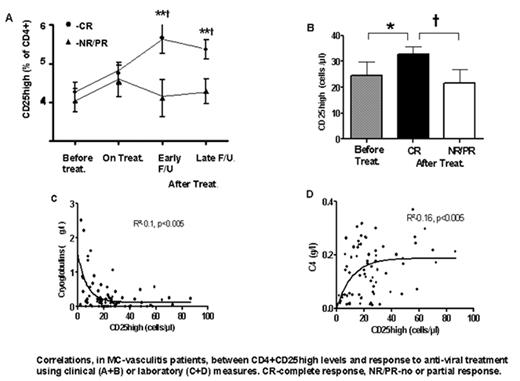Abstract
Background- Mixed cryoglobulinemia (MC) vasculitis is an autoimmune disorder associated with chronic hepatitis C virus (HCV) infection. We previously reported that MC vasculitis is associated with a quantitative defect of peripheral blood regulatory T cells (Tregs). We aimed to prospectively evaluate the evolution of this defect during the course of anti-viral treatment.
Methods- Treg frequencies and numbers were analyzed in 131 HCV chronically infected patients (including 66 with MC vasculitis) and 20 healthy volunteers. Measurements were taken before, during and after treatment with Pegylated Interferon and Ribavirin.
Findings- At baseline, patients with MC vasculitis had significantly lower frequency and number of Tregs than patients without MC vasculitis. Complete remission of MC vasculitis following anti-viral treatment was associated with a significant increase in Treg levels compared to baseline levels. In contrast, Treg levels in non- or partial-responders, which did not differ from those of complete responders at baseline, remained unchanged over the course of the study, and where significantly lower that those of complete responders.
Interpretation- The strong positive correlation between clinical responses and Treg levels provides additional support for the central role of Treg cells in the pathogenesis of HCV-induced MC-vasculitis. Furthermore, it emphasizes the dual role of Treg cells in chronic HCV infection: while they may hinder viral elimination, Treg cells also have a beneficial role in limiting autoimmune tissue injury.
Correlations, in MC-vasculitis patients, between CD4+CD25 high levels and response to anti-viral treatment using clinical (A+B) or laboratory (C+D) measures. CR-complete response, NR/PR-no or partial response.
Correlations, in MC-vasculitis patients, between CD4+CD25 high levels and response to anti-viral treatment using clinical (A+B) or laboratory (C+D) measures. CR-complete response, NR/PR-no or partial response.
Author notes
Disclosure: No relevant conflicts of interest to declare.


This feature is available to Subscribers Only
Sign In or Create an Account Close Modal